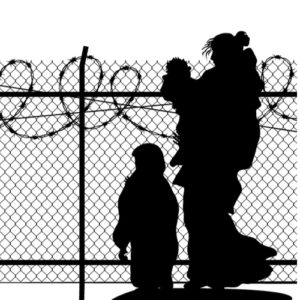
Social Work’s response to the immigration crisis includes fighting inhumane conditions, family separation, and fighting for policy change. We are in the midst of a refugee and immigration crisis in the United States.
In 2019, we had a record number of people across the southern border each month. The problem is at the border, in immigration and refugee policy, and in towns and cities across this country where long-time US residents live in fear of being deported. An immigration social worker can play critical roles in addressing the immigration and refugee crisis.
Those crossing the border do so for several urgent reasons, including poverty and hunger, gang violence—including the forced recruitment of minors into gangs— and violence against women and families. Most refugees and migrants who cross the southern border originate from Central America – Guatemala, Honduras, and El Salvador. Known as the northern triangle, this region is one of the most violent on earth.
Ravaged by a history of civil and political conflict and deep poverty, citizens of these countries often perceive no other choice than to flee for their lives.

Addressing Poverty in the Northern Triangle
An immigration social worker can have an essential role in understanding and trying to change conditions in migrants’ home countries. One of the significant issues forcing families and unaccompanied minors to flee the northern triangle countries is the recruitment of children into gangs against their will. Deep poverty and conflict have contributed to these countries breeding grounds for infamously brutal gangs such as MS-13.
These countries’ economic problems are due to climate change, lack of development, and government corruption. An immigration social worker can advocate for international policies that help address conditions in this region. For example, US policies encouraged economic growth in the northern triangle countries and southern Mexico. These sought to improve economic conditions and help stem the mass migrations.
Addressing Violence Against Women
An immigration social worker can also address violence against women in the northern triangle countries. There is widespread impunity for those who commit violent acts against women in Guatemala. This means that the legal system and government fail to hold perpetrators legally accountable for violence and murder against women. This is referred to as femicide when women are murdered with impunity.
A licensed clinical social worker has worked with international human rights groups and local women’s rights organizations in the northern triangle countries to help address this epidemic of violence against women. A social worker working in international human rights or who have personal ties to these countries can advocate for political, cultural, and social change to help stem the tide of violence against women in this region.
Supporting Refugees
A social worker can also work with refugee claims. There is political and legal disagreement about which Central American migrants should claim refugee status. Under President Trump, refugee laws changed. For example, the administration has made it more difficult for those fleeing poverty, gangs, and domestic violence to claim refugee status.
Some believe a migrant should only receive refugee status if they are fleeing political persecution or war. Others argue citizens of these countries are essentially running a state of war-like lawlessness. Women’s rights advocates believe that women fleeing violence are members of a persecuted minority. A social worker can advocate for better refugee laws and policies, including increasing the number of courts, lawyers, and judges at the border to process the overwhelming number of refugee claims.
Fighting Inhumane Conditions
Social workers involved in addressing the situation migrants also find themselves on the Mexican side of the border. The Trump administration convinced Mexico to hold large numbers of migrants on the Mexican side of the border and not cross in the US. But, the conditions migrants are in on that side are also inhumane.
People are in large holding areas for weeks or months at a time. The requirements are unsanitary and crowded. In addition, many children and adults have also fallen victim to gang predation on that side of the border.
Fighting Family Separation
In the US, holding conditions for migrants has also been inhumane. Children separated from their parents and kept in metal cage-like holding pens. As a result, parents have lost track of their children and have had to put significant resources and efforts into getting them back. Social workers urged the administration to change their family separation policy and have helped separated families reunite. They also place children in temporary foster care while waiting to reunite with family.
Social workers also protest the inhumane conditions at the border. These included holding adults and children for prolonged periods in cramped, unsanitary conditions. There is not enough food and water, and migrants cannot manage their hygiene. They can also improve the training and credentialing of staff who work in migrant shelters and camps. They may also serve as supervisors in these settings. Or as frontline caseworkers making a difference in the lives of individuals and families in crisis.

Advocacy Work
Social workers also work on advocacy efforts. For example, they serve as staff members of nonprofit organizations that serve migrants, immigrants, undocumented immigrants, and refugees. Social workers educate undocumented immigrants about their legal rights. They also teach them how to respond to Immigration and Customs Enforcement (ICE) and navigate immigration laws.
In addition, they may help clients find services, child care, work, and benefits.
Furthermore, they provide therapeutic services to traumatized children, families, and adults. One prominent organization located at the border doing vital immigrant advocacy work is Refugee and Immigrant Center for Education and Legal Services (RAICES). Bilingual social workers work in refugee communities. Additionally, there is a shortage of bilingual social workers.
NASW Statement on Immigration
The National Association of Social Workers (NASW) issued statements on the administration’s immigration policies. It also lobbied Congress to resist changes to immigrant benefits and services. So, to work with those affected by the immigration crisis, contact a local immigrant advocacy organization or NASW chapter. Unfortunately, there is no widescale solution to the immigration crisis in sight with gridlock in Washington. And social workers continue to be in great demand to help vulnerable individuals and work toward policy change.
What does an immigration social worker do?
The United States has always been considered a nation of immigrants. There are several ways to immigrate to the United States, including asylum-seeking and family reunification. This means that immigration social workers are always needed in a variety of different settings. Some immigration social workers choose to work in hospitals or government agencies, while others work in schools, refugee camps, and social service agencies. Immigration social workers provide direct support and a variety of services to immigrants to help them make the transition to their new homes.
Since there is a massive global refugee crisis currently, more than 68 million people have been displaced from their home countries. On a daily basis, families with children enter the United States daily to escape their own poverty-ridden countries, many of which are filled with violence and poor economic conditions.
Social workers are much-needed advocates for these people. Social workers help immigrants with navigating an unfamiliar system. Immigrant social workers can help immigrants secure education, housing, employment, and health care. Many immigrants suffer from language barriers as well as emotional and mental health issues. Immigration social workers are able to recognize these and other challenges that immigrants face to be able to provide the proper support to them.
Because immigration is an issue throughout the world, social workers are needed to assist them in the United States as well as other countries. Some immigration social workers opt to become international social workers. This allows social workers to secure positions in other countries while assisting the people who are immigrating there.
Become an immigration social worker. Here are some examples of the work and jobs you could come across:
- refugee populations
- labor statistics
- urban environment
- immigrant children
- social justice
- immigrant community
- military service members
- immigration issues
- vulnerable and oppressed individuals
- most immigration social workers
- mental health
- immigrant clients
- community organizing
- immigrant and refugee populations
- community health organizations
What can social workers do for refugees?
Most of the time, there are multiple agencies and organizations that are working on one single refugee case. Social workers play key roles in this process. This is due to the fact that social workers are very well equipped with the skills needed to find solutions to the many challenges that refugees and immigrants face.
Social workers are responsible for assisting refugees and other immigrants with their basic needs. This means that social workers help immigrants secure shelter, food, water, and even employment. Social workers also report major issues involving immigrants, such as domestic violence, child abuse, sex crimes, and employer exploitation.
Social workers work with social service and law enforcement agencies to remedy these major issues. They can also act as mediators for immigrants who are hesitant to report these types of crimes because they are fearful of being deported. Social workers also play a key role in helping immigrants who are victims of anti-immigration policies or who are being discriminated against.
Immigrant social workers are able to serve as allies for those people who are seeking asylum when coming to the United States for safety. From their basic physical needs to legal protection, social workers are needed to assist immigrants with these types of challenges.
Related:

